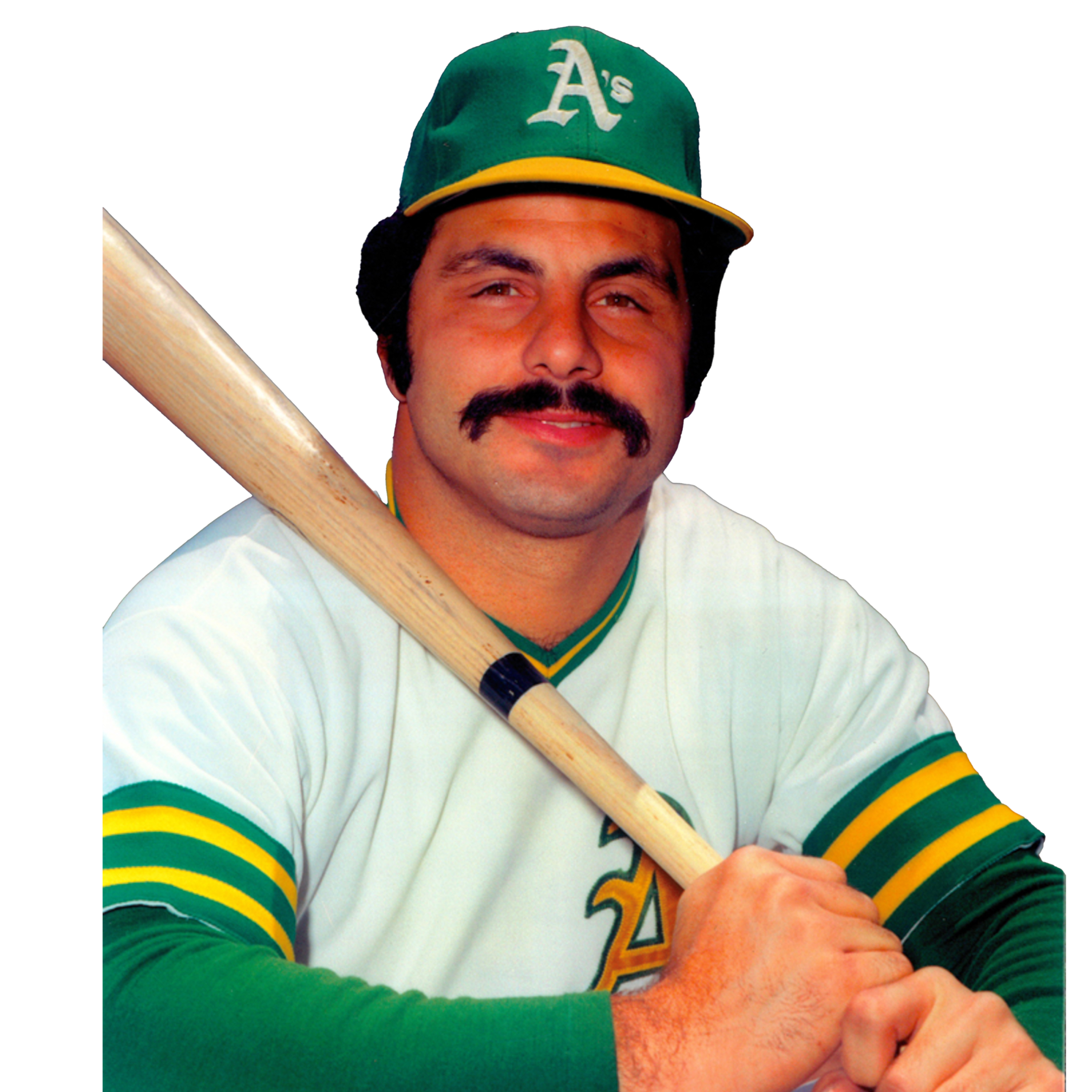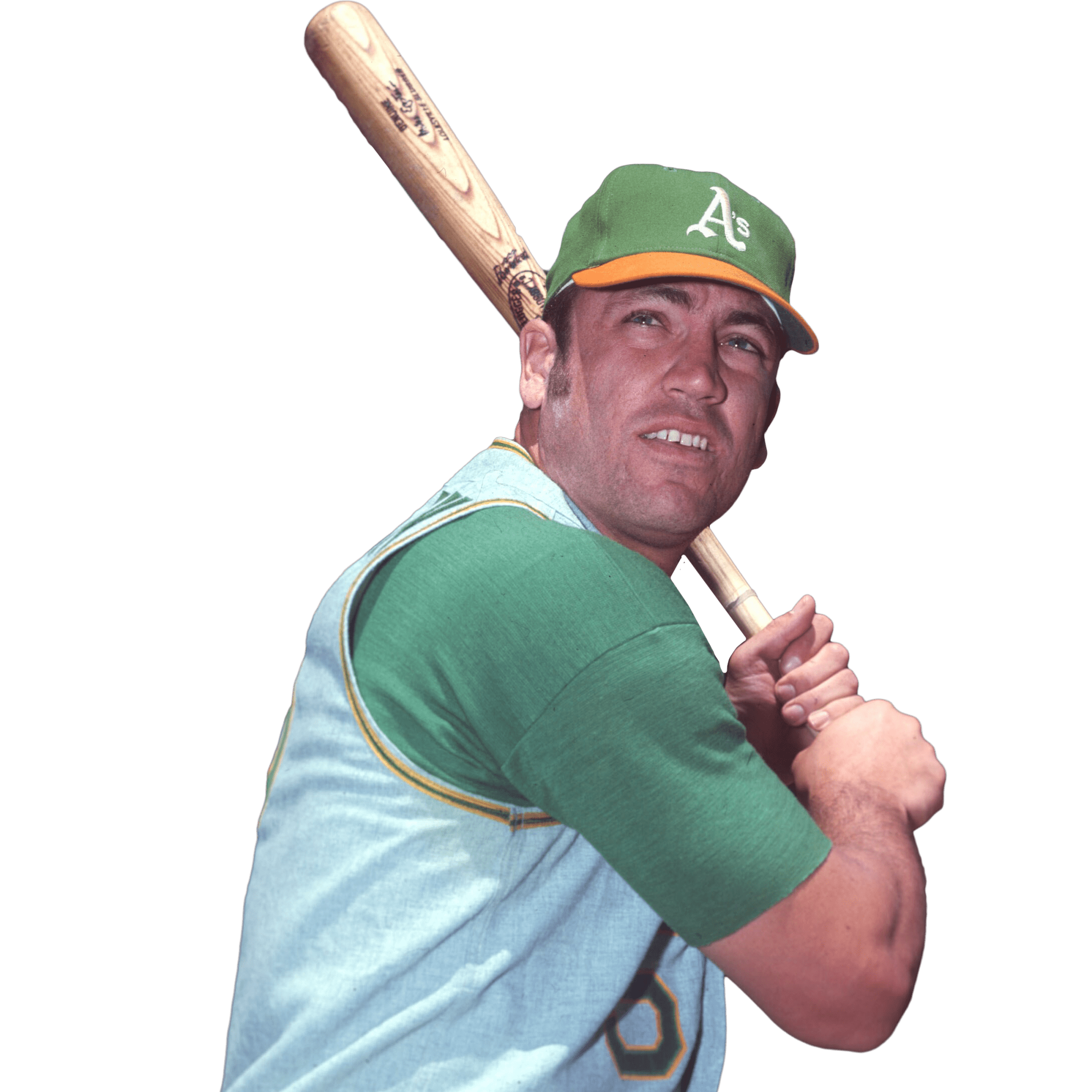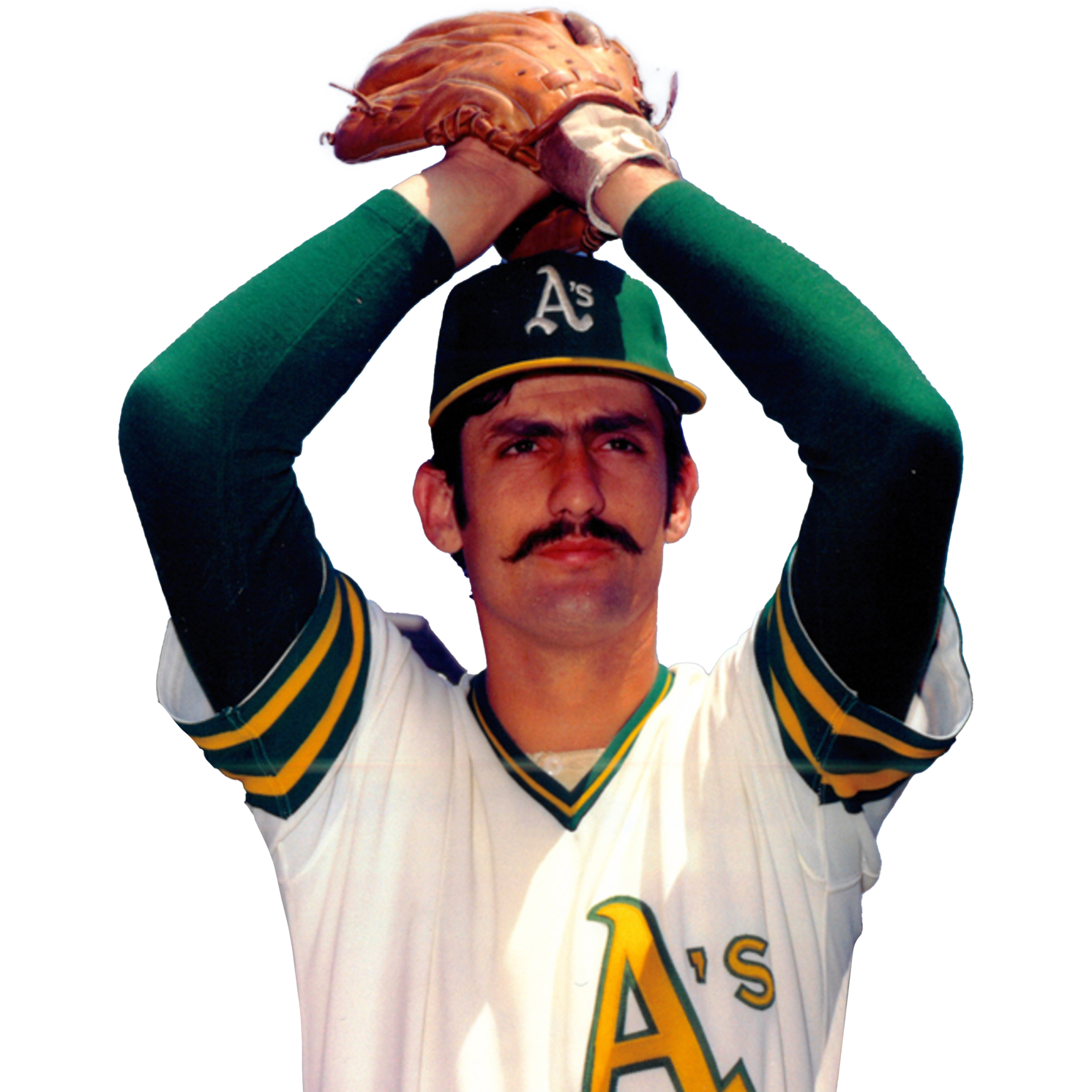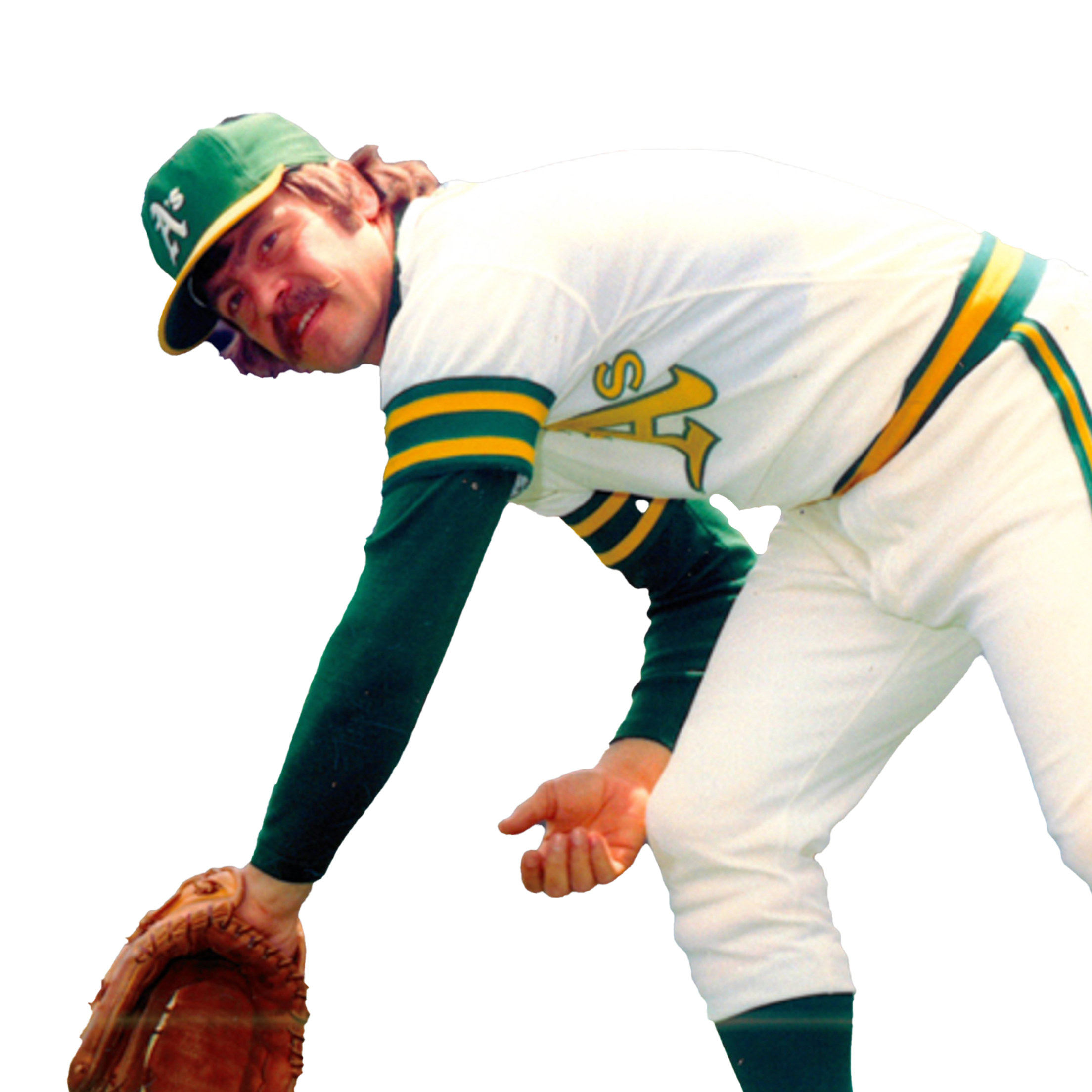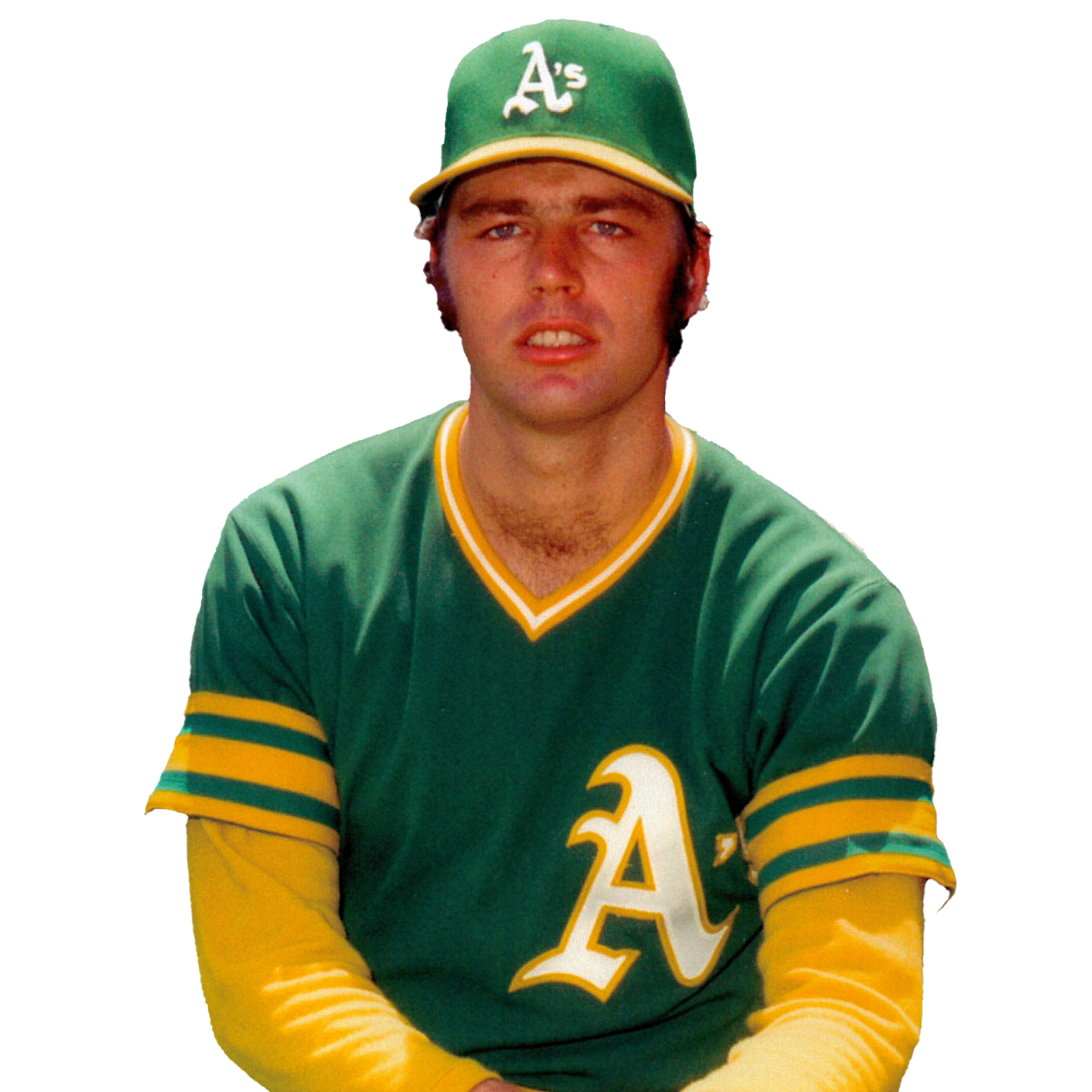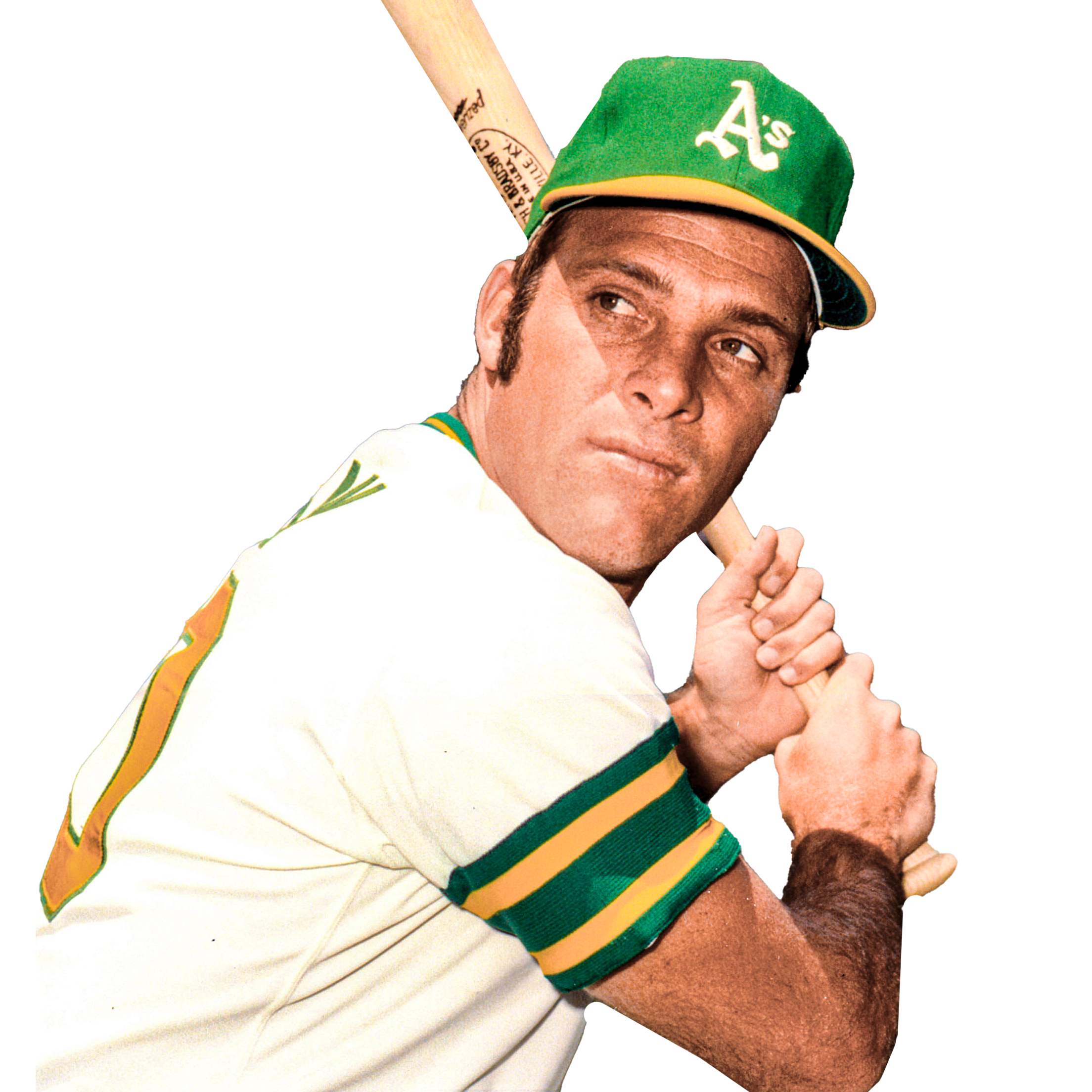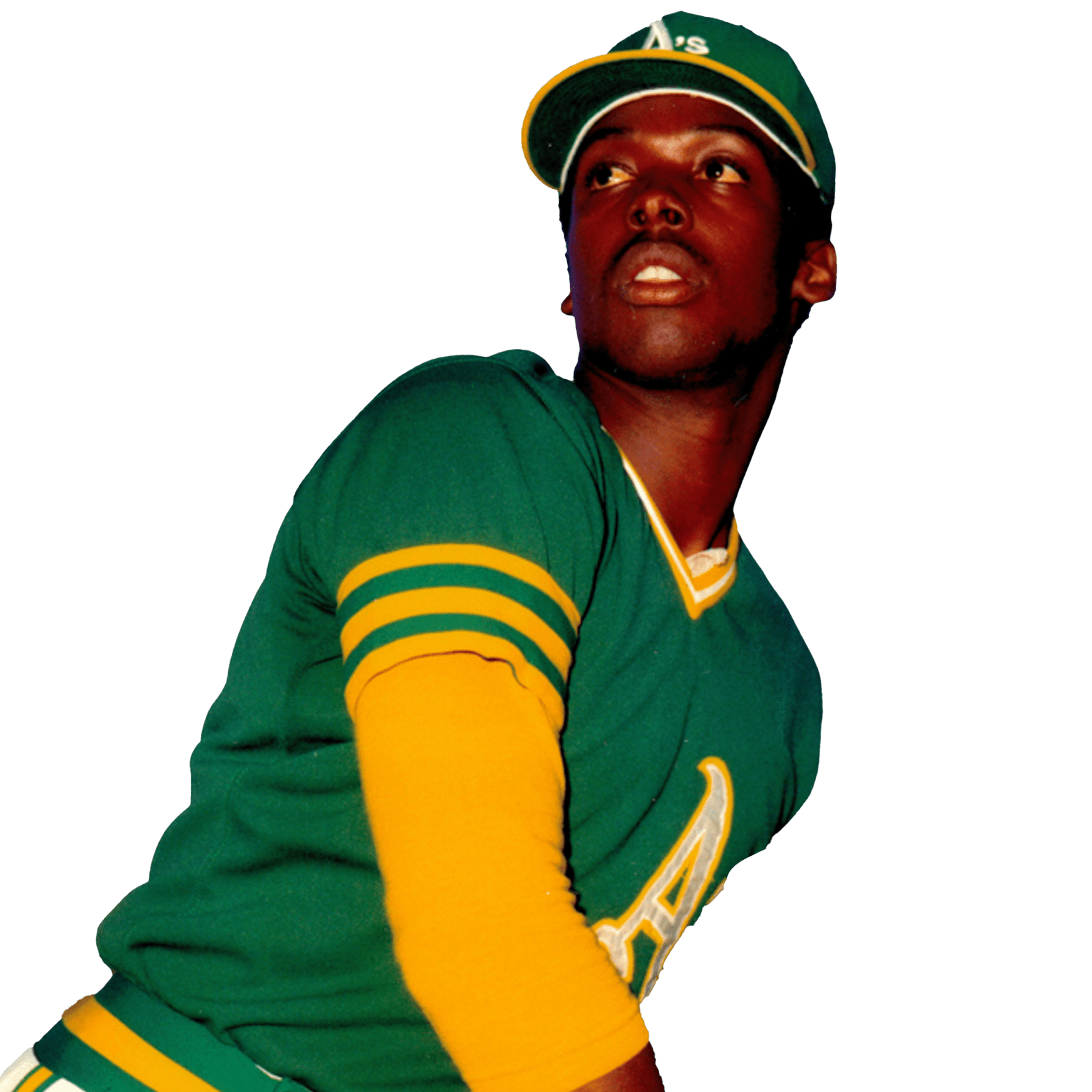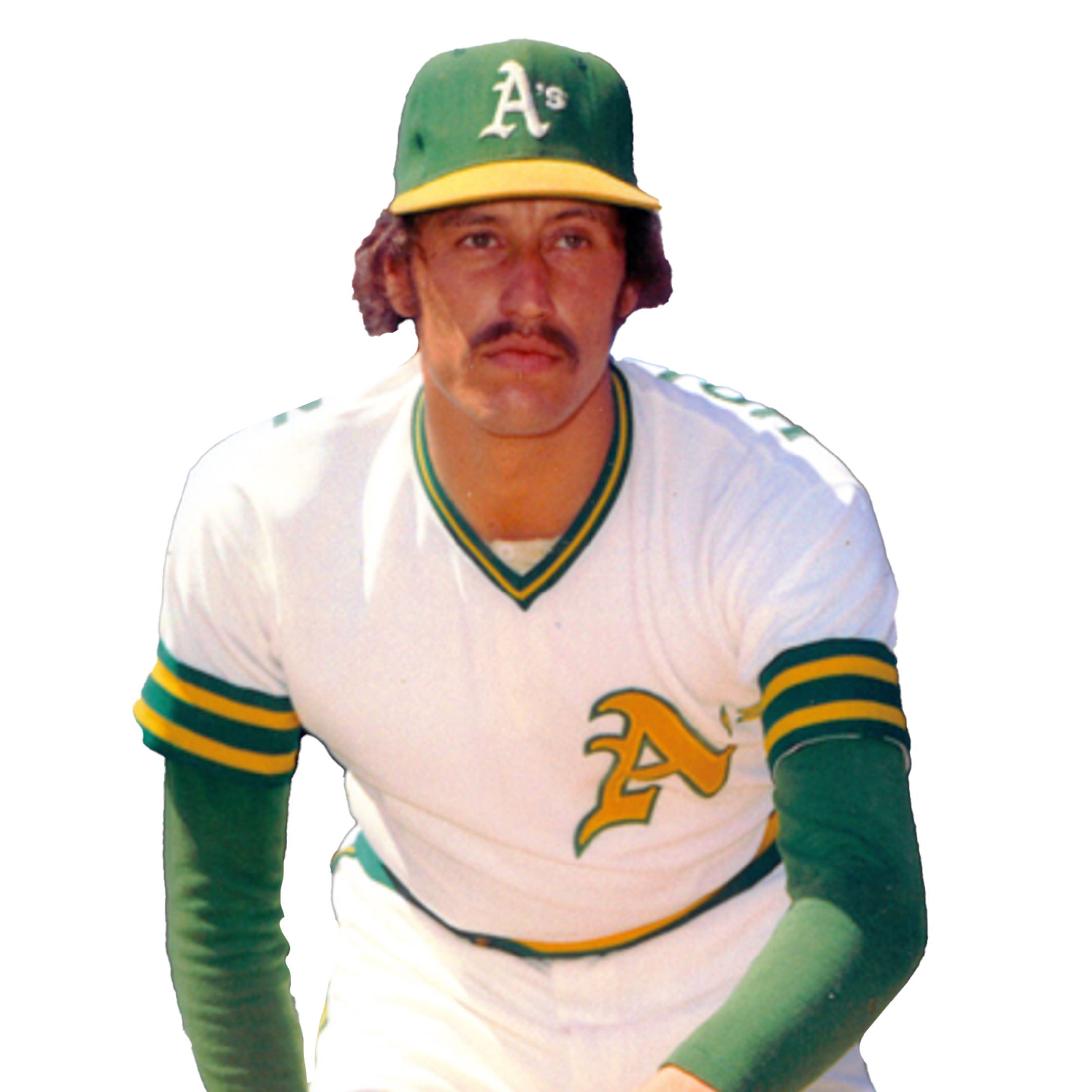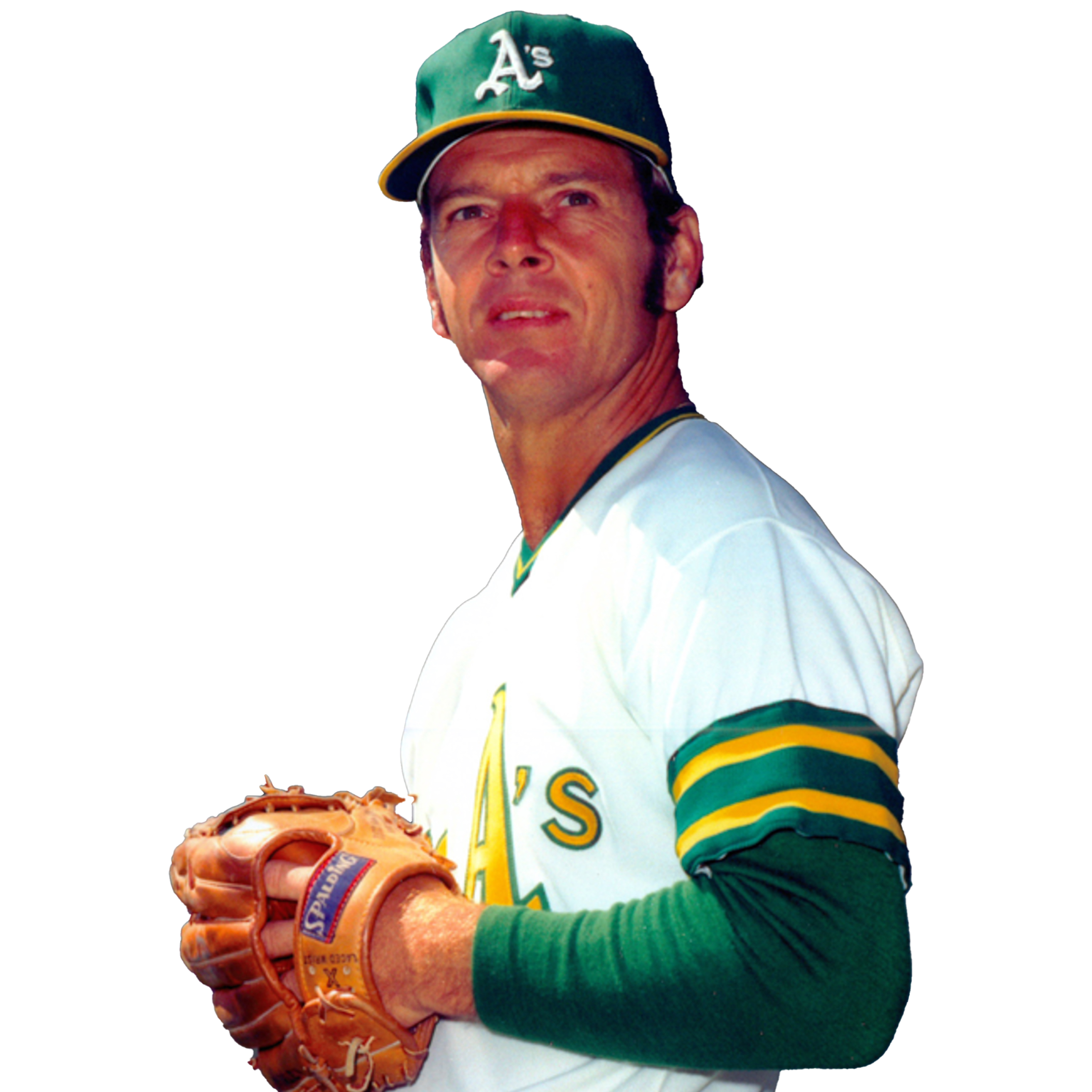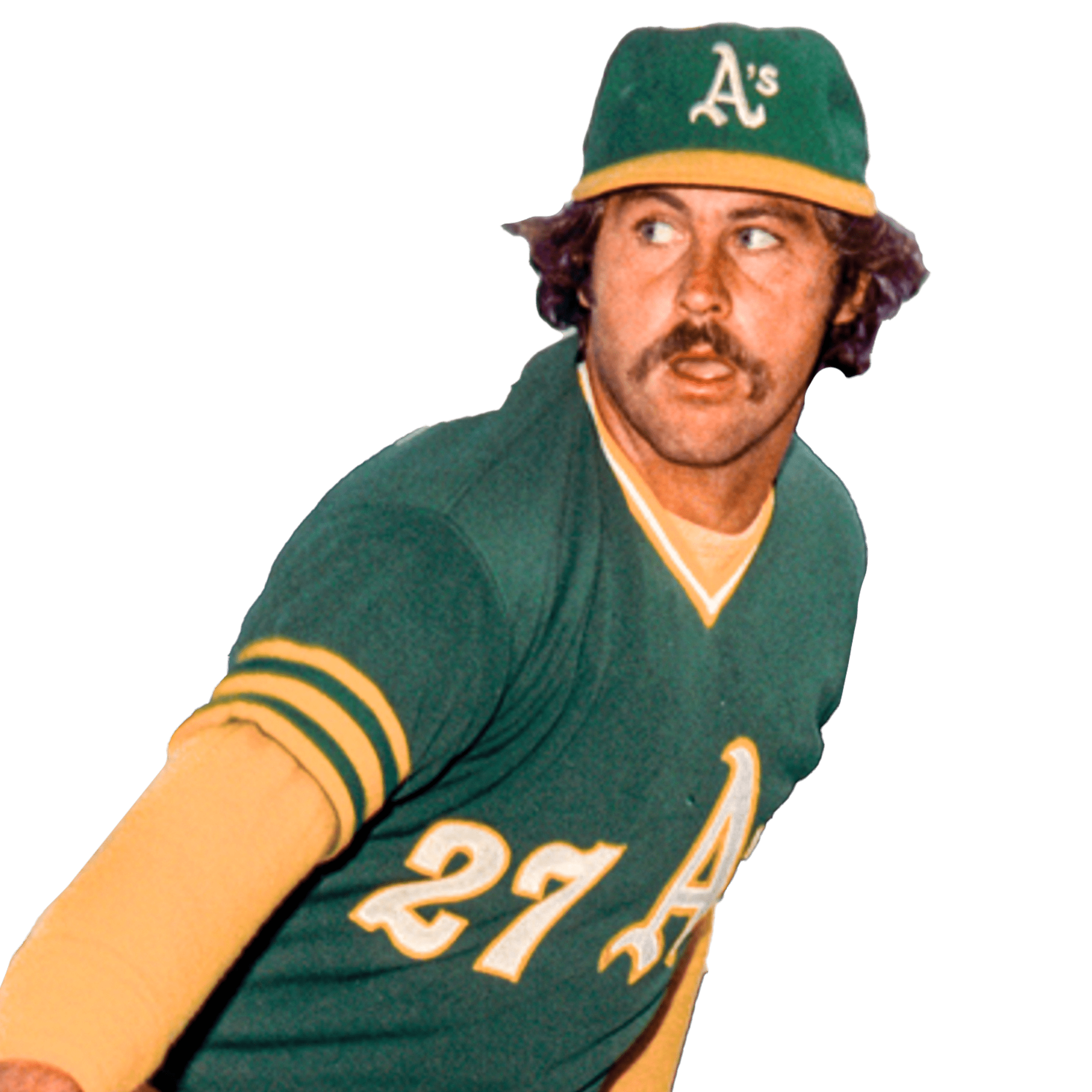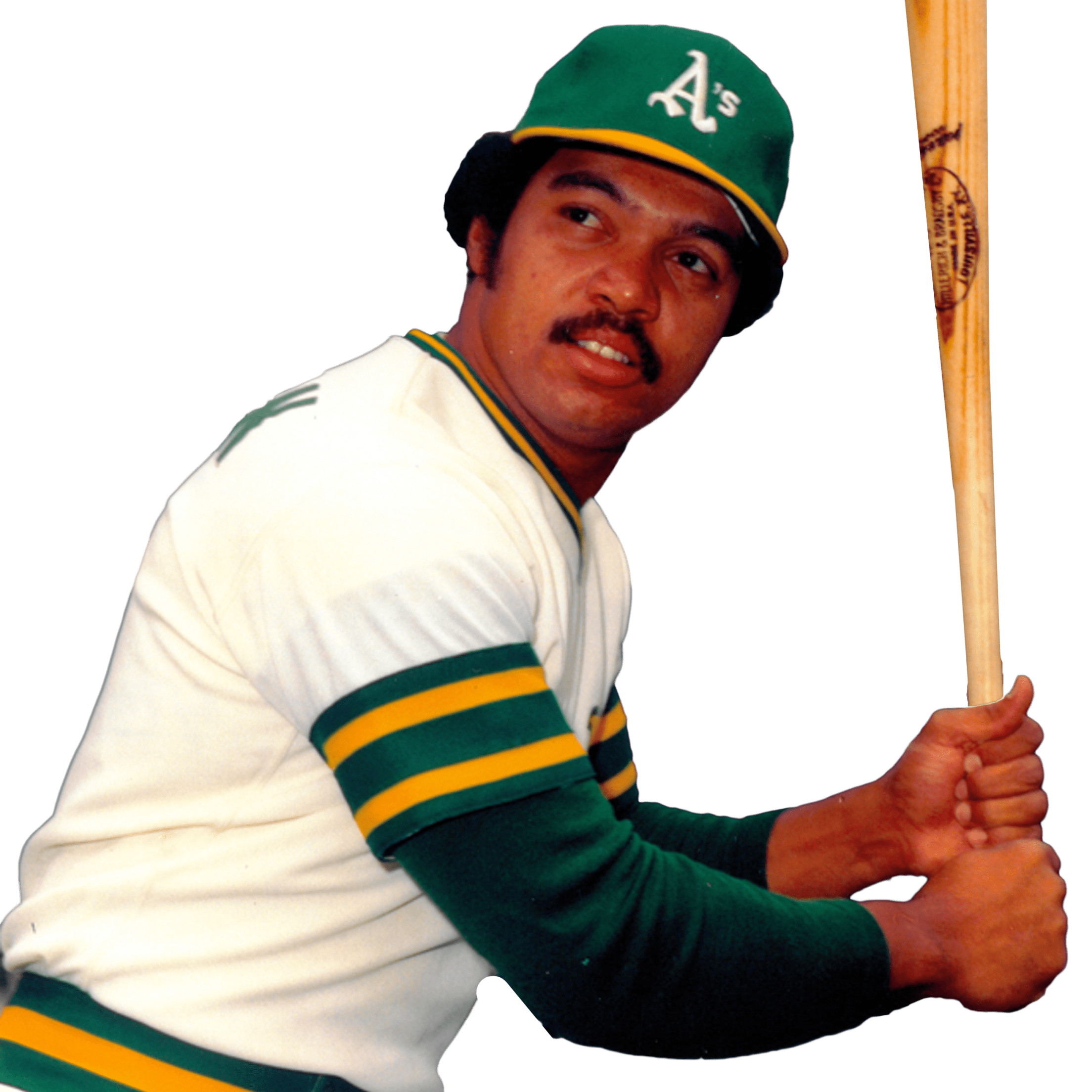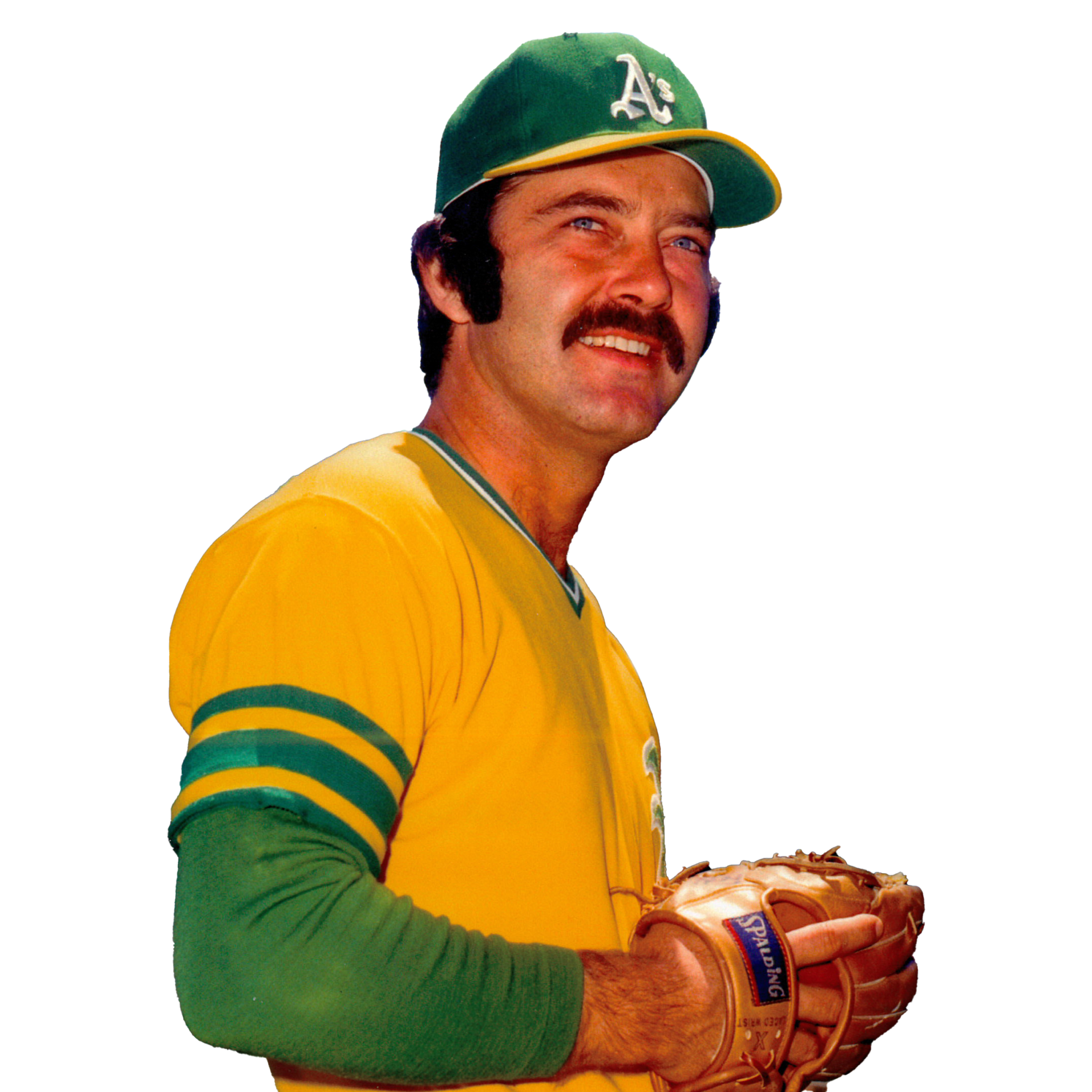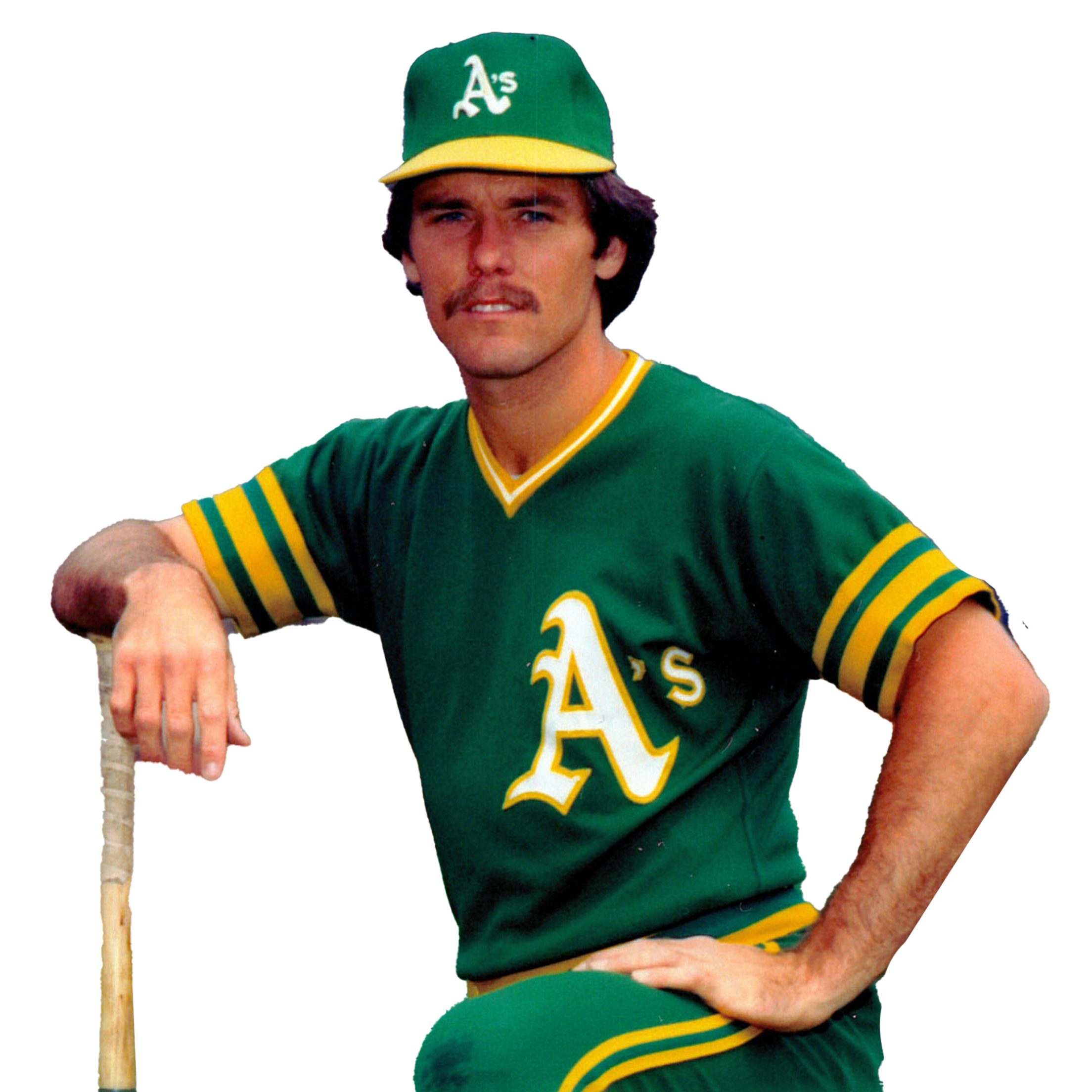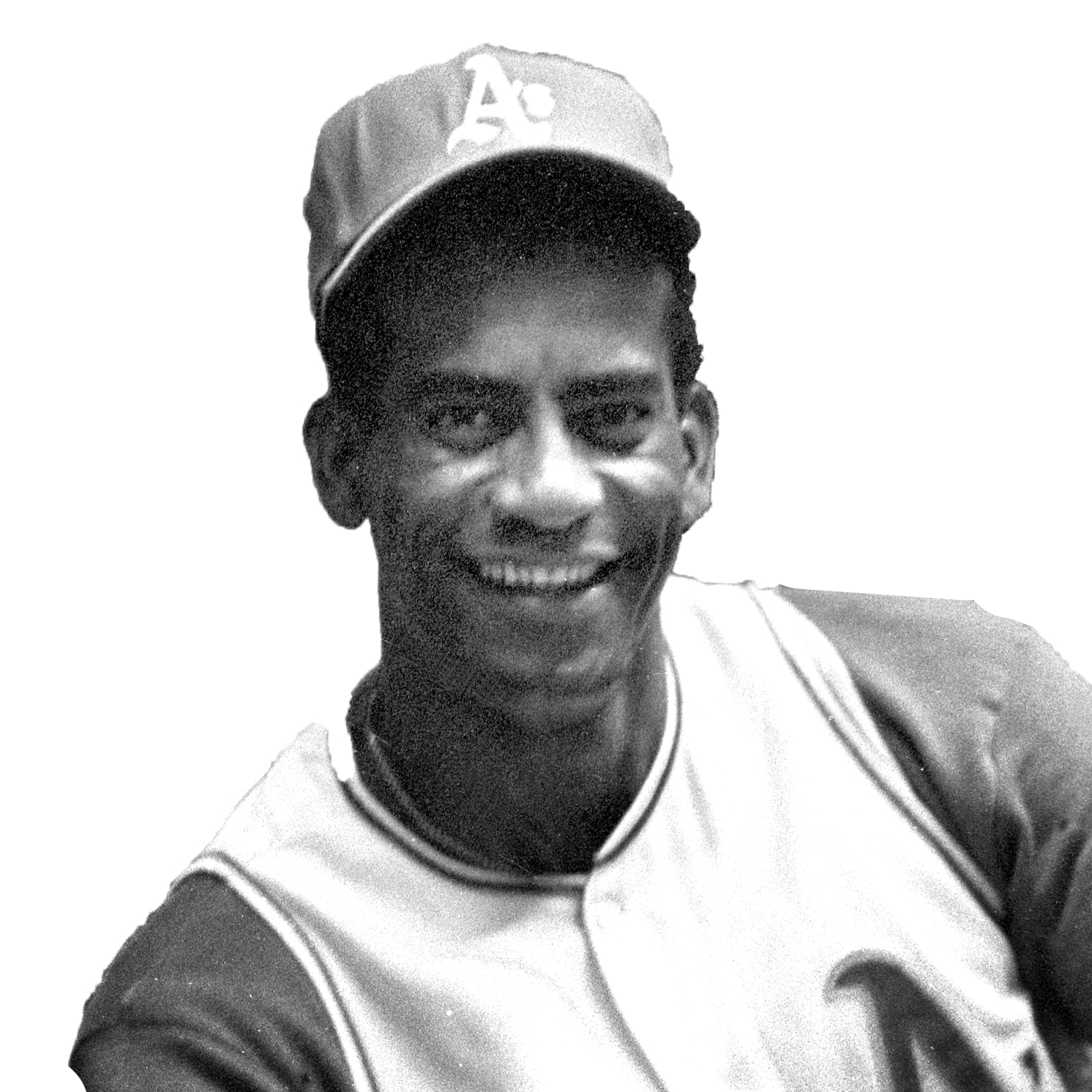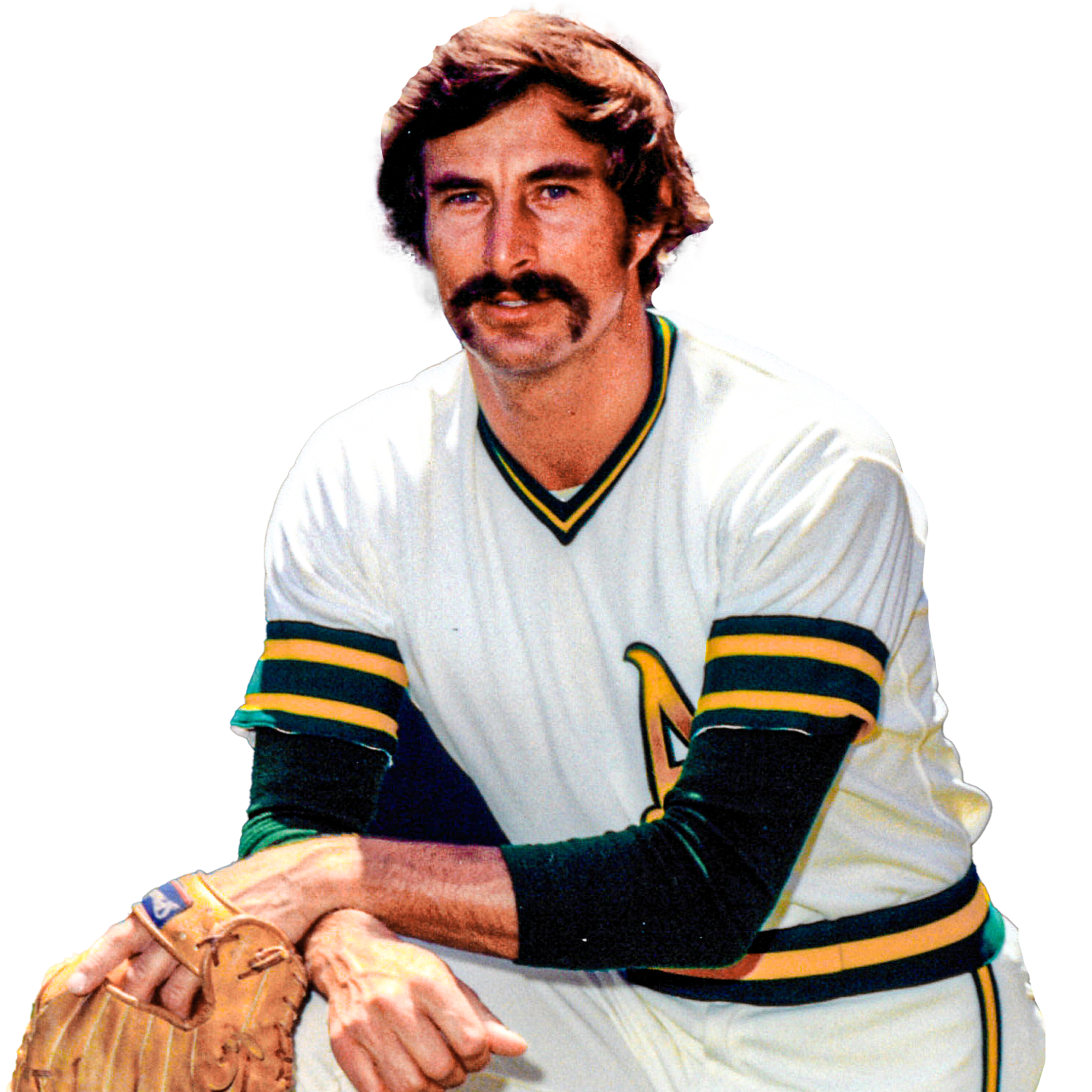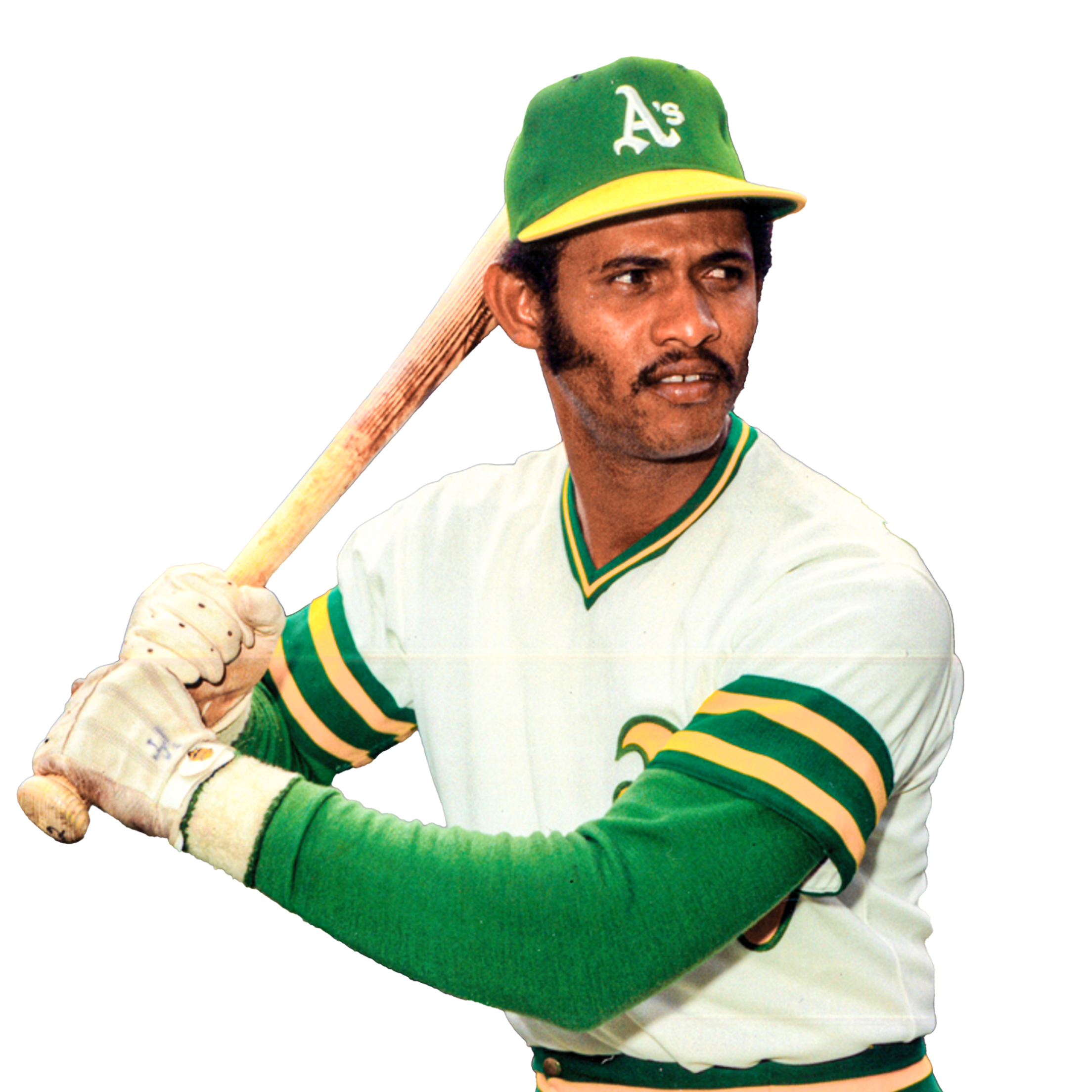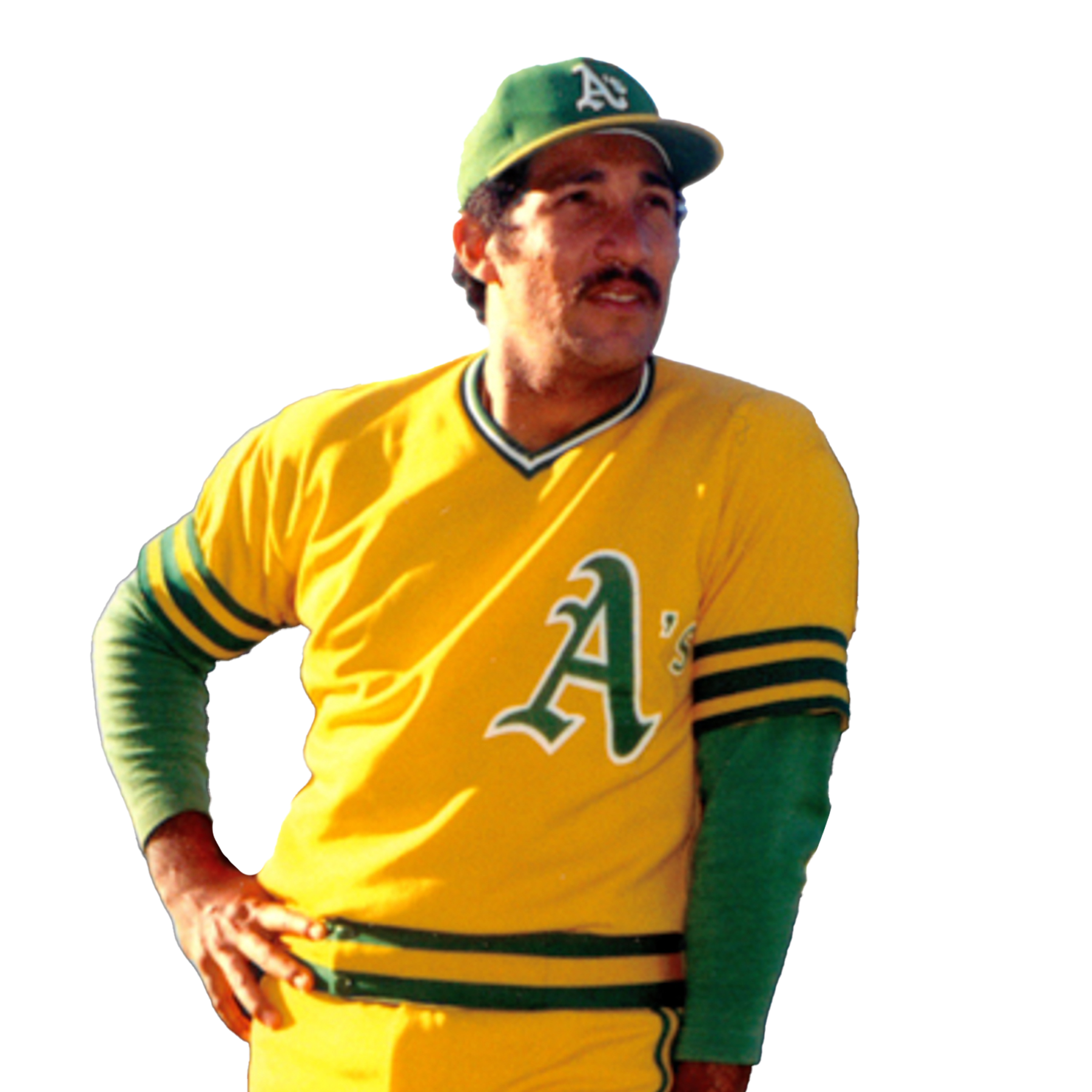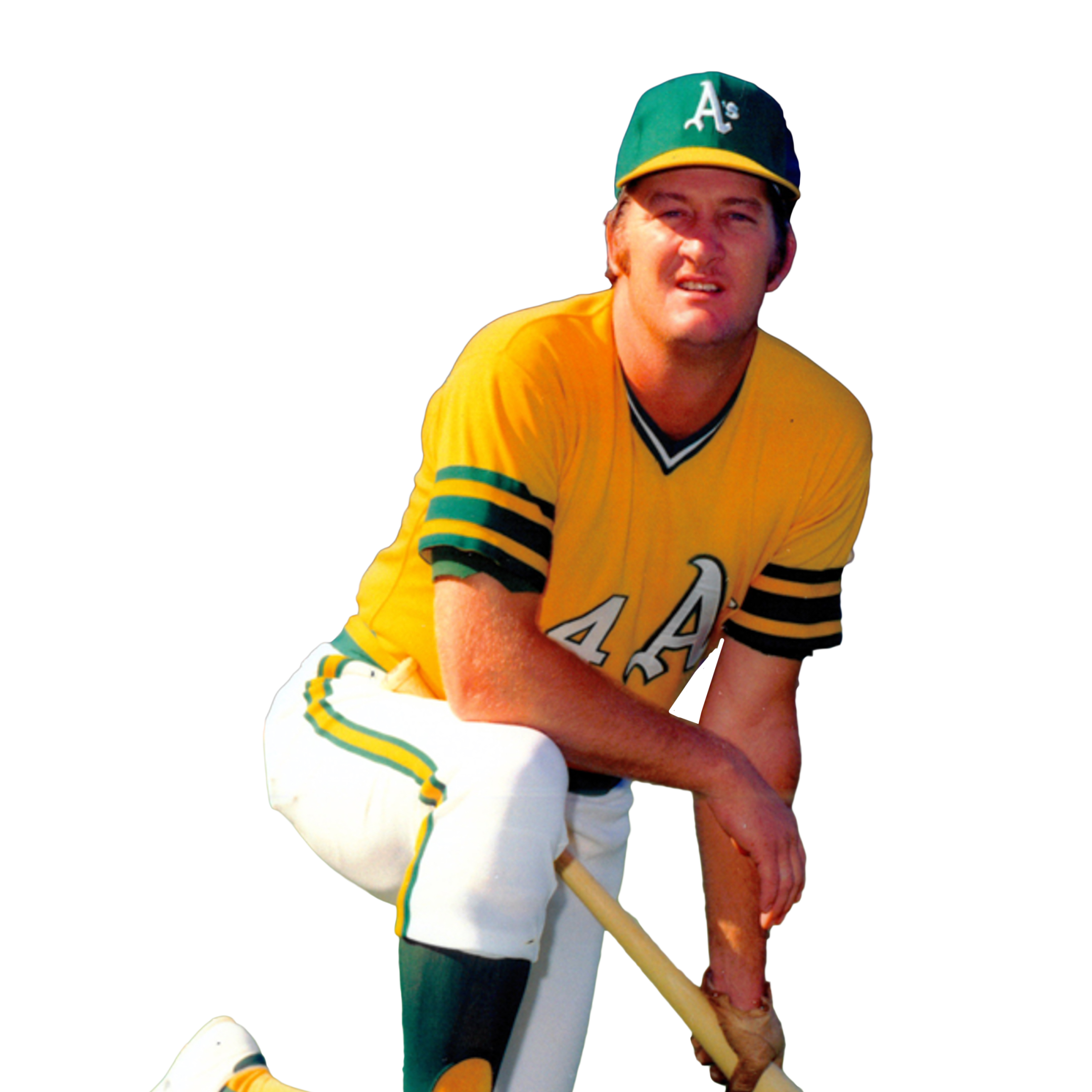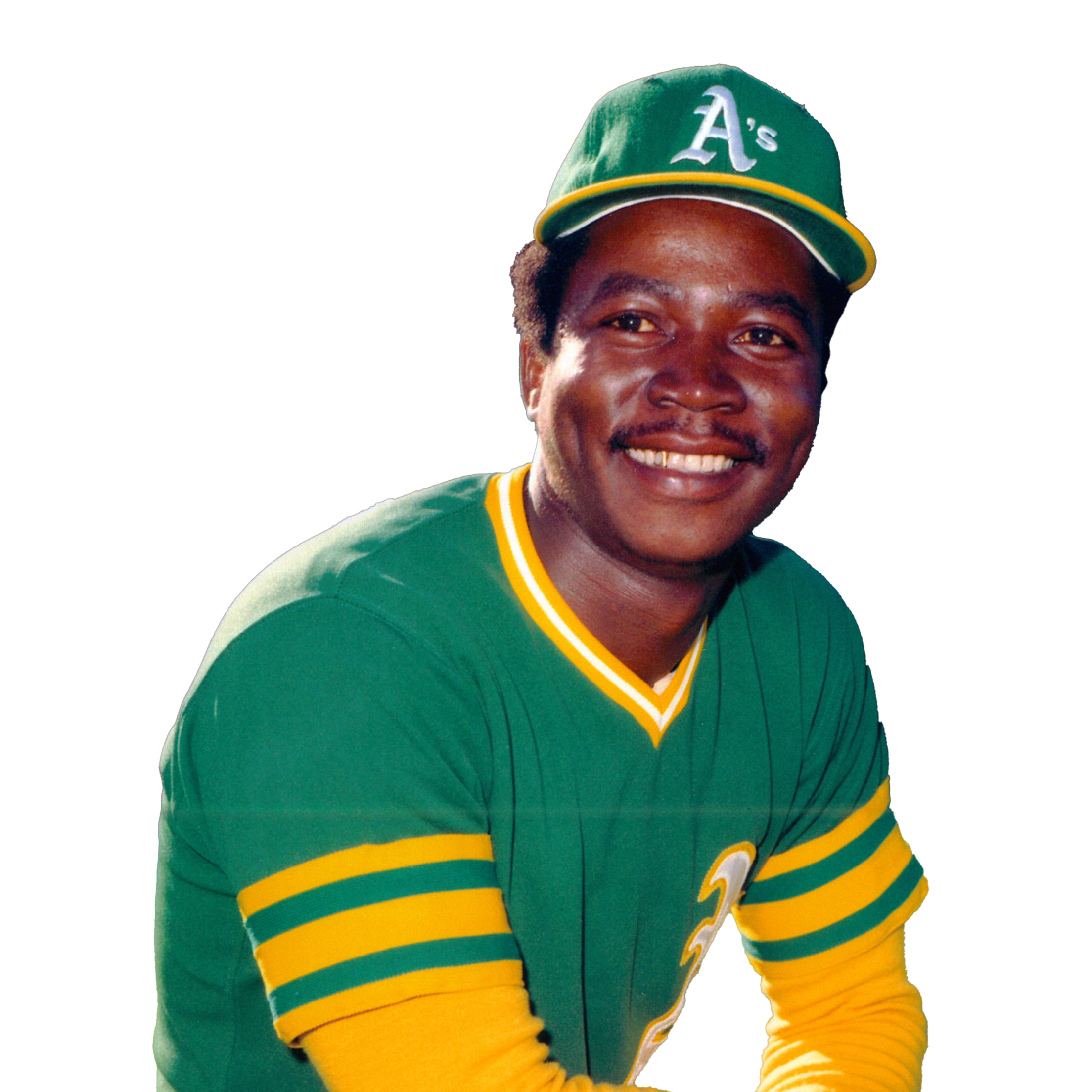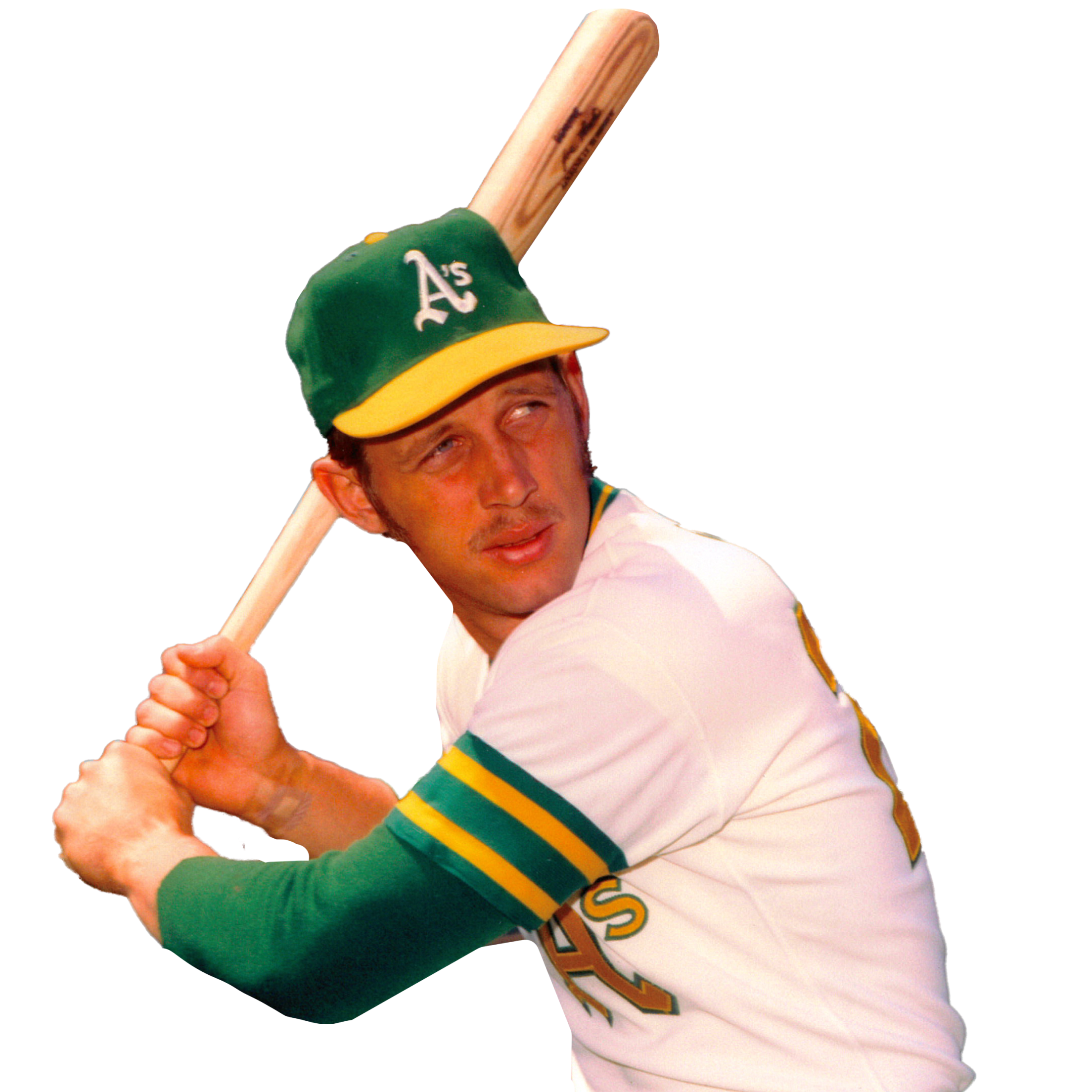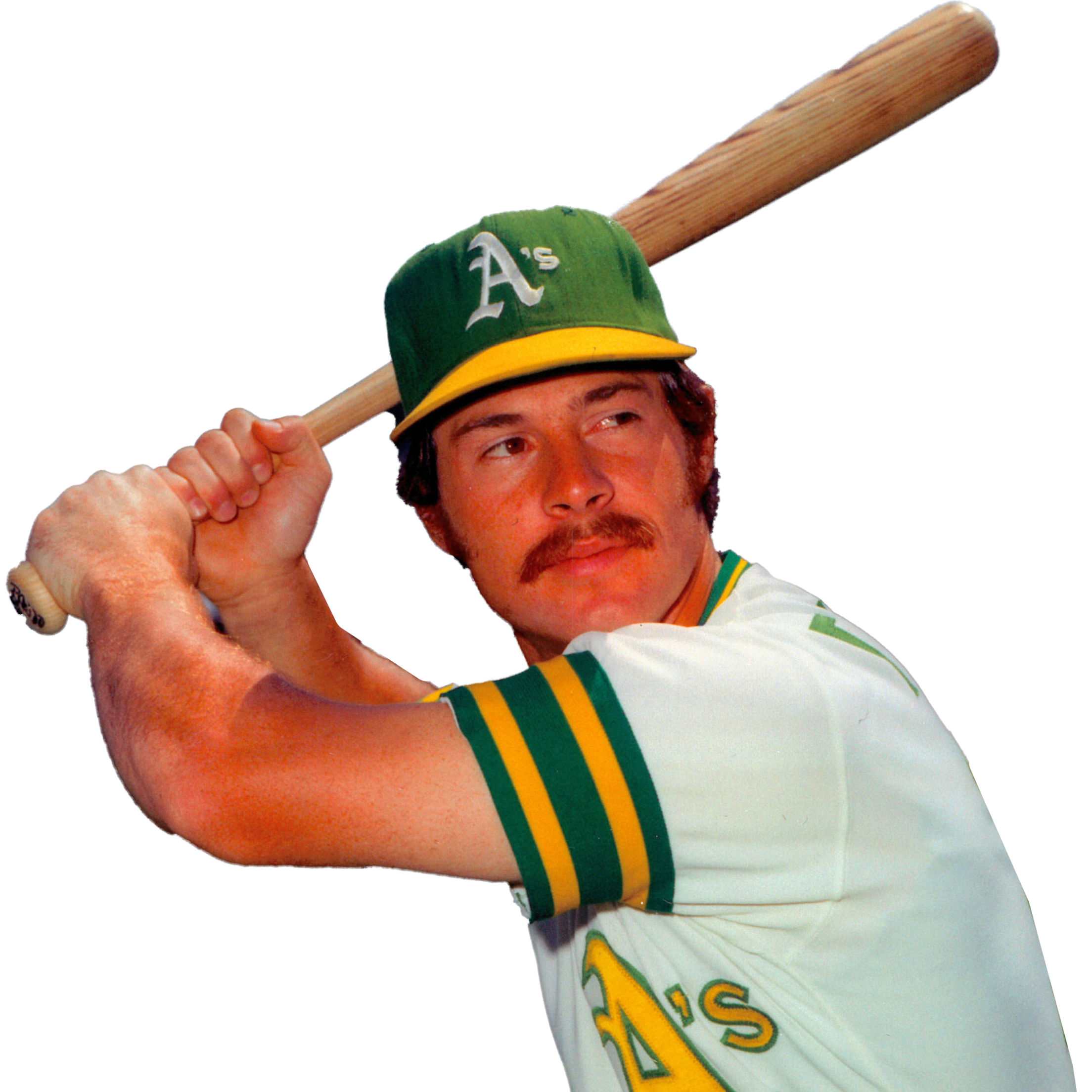Charlie Finley with Gonzalo Marquez
Oakland Athletics owner Charlie Finley with 1972 World Series hero Gonzalo Marquez.
After you take a photo with the trophy, stay in the Eastside Club and check out photos and bios of each member of the 1972 World Series team by using the QR codes. Or read their bios below.
Matty Alou, of the famous Alou baseball family, played part of one season for the Athletics - the 1972 season. Matty was only 21 when he broke into the Big Leagues and was an outfielder and 1st baseman. In 32 games, he collected 34 hits for a .281 average and batted .381 in the 1972 ALCS. Matty died in 2011 in his home country of the Dominican Republic.
Oakland A's team captain, Sal Bando, was a respected leader who had a pivotal role in leading the Oakland A's during their three year run as World Series Champions. The four time All-Star finished second, third, and fourth in the most valuable player voting from 1971-1974, with a 16 year MLB career of 242 home runs.
Playing nine of his 17 seasons in Oakland, Vida Blue, at age 21 was named the MVP and Cy Young winner in 1971 with the Oakland A's. This hard-throwing, left-handed pitcher who was selected for six All-Star games, earned the save in game one of the 1972 World Series, getting the final seven outs.
Bert "Campy" Campaneris is the Athletics all-time leader in games played and hits. In his 13 seasons with the A's, he led the league in steals six times and earned five of his six all-star honors. In the 1972 season alone, he stole 52 bases and batted .429 with two stolen bases in the 1972 ALCS.
Tim Cullen is a San Francisco native who played collegiately at Santa Clara and helped the Broncos reach the championship game of the 1962 College World Series. The infielder’s final season of his seven-year career in MLB was 1972 with the Oakland A’s. He played in two games in the 1972 ALCS at shortstop.
Dave Duncan was only 18 years old when he made his Major League debut. He spent the beginning of his career playing for the Kansas/Oakland Athletics from 1964-1972, making him a member of the World Series Championship team.
Mike Epstein was a lefty first baseman for the A’s. He batted .270 with a team-leading 26 homers in the 1972 season which was his first full season with Oakland. Another highlight of his baseball career was being a member of the 1964 U.S. Olympic Baseball Team.
Hall of Famer and seven time All-Star pitcher, Rollie Fingers, spent the first nine seasons of his 17 year career with the Oakland A’s. Rollie helped the A's capture their third straight World Series Championship by closing out the final two innings of game 7 of the 1972 World Series. Not only did Rollie’s pitching put him on the map, but also his iconic facial hair–the handlebar mustache.
Dick Green was one of the best fielding second basemen of his time and played his entire career in Green and Gold starting at Kansas City then Oakland. As he started all 19 of the A's World Series games at second base from 1972-74, he was honored with the Babe Ruth Award for the best performance in the 1974 postseason. He was the career leader for games played by a second baseman (1158) and batted .333 in the 1972 World Series.
Dave Hamilton was a lefty pitcher who was a 5th round MLB Draft pick. While playing in the Minor Leagues, he was called up by the A’s early in the 1972 season and had an ERA under three. He then spent six of his nine seasons in MLB with the Oakland A’s. He served as a reliever for the majority of his career but then began as a starter. After retiring in 1980, Dave Hamilton remained connected to baseball and became a coach for the Grizzlies at California High School in San Ramon, California leading them to the East Bay Athletic League Championship.
Mike Hegan played in parts of three seasons in Oakland as a first baseman and outfielder. During the 1972 season, he batted .329 in 98 games with the Green and Gold. Mike passed away in 2013.
George Hendrick was the A's first round draft pick in 1968 and made his debut with Oakland in 1971. George played the first two years of his 18-year career with the A's and started the first five games of the 1972 World Series in center field after Reggie Jackson was injured in the final game of the ALCS.
After breaking into the Big Leagues playing with the Chicago Cubs, Ken Holtzman was a hard-throwing, lefty pitcher who spent his best years with the Oakland A’s. When Ken joined the A’s he didn’t have any personal goals such as a certain number of games won, but he wanted to make sure that he contributed to the team getting to the World Series.
Joe Horlen spent the first 11 seasons of his career with the Chicago White Sox before concluding his career in 1972 with the A's. Joe pitched in 32 regular season games, including six starts, and then made one relief appearance in both the ALCS and World Series. Joe passed away earlier this year in April.
Catfish Hunter was an eight time All-Star, 1974 Cy Young award winner and 1987 Hall of Fame inductee. He has many highlights of his career including, throwing a perfect game on May 8, 1968, pitching 8 ⅔ innings in game two of the 1972 World Series, 1.17 ERA in two 1972 ALCS games over 15 ⅓ IP and went 21-7 in 1972 with a 2.04 ERA. His number 27 is retired by the A’s and he was part of the inaugural Athletics Hall of Fame. Catfish Hunter died of ALS in 1999.
Right fielder Reggie Jackson, also known as, “Mr. October”, was the 1973 World Series MVP and the American League MVP in 1973. Even though he was injured during the ALCS and missed the 1972 World Series, he was instrumental in the ALCS, collecting 5 hits with a .278 average during the series. During his 21 year career, Reggie hit 563 home runs and earned 14 All-Star honors with six of those All-Star nods with Oakland. He was inducted into Cooperstown in 1993 and the Athletics Hall of Fame in 2018.
As a relief pitcher, Darold Knowles is a member of the Oakland A's dynasty that won three consecutive World Series. In 1973, Darold became the first pitcher to appear in all seven games of the World Series. Going 5-1 with a 1.37 ERA and 11 saves in 1972, Darold assisted the A's to the division title.
Infielder, Ted Kubiak, played for a total of seven years with the A's, starting with the Kansas City A's and then played two stints in Oakland. For the A's three consecutive World Championship teams from 1972-74, he played second base, third base and shortstop.
Allan Lewis spent his entire six-year career with the A's, first in Kansas City in 1967 and then with Oakland from 1968-70 and 72-73. Allan appeared in six of the seven games in the 1972 World Series, all as a pinch runner. As a "designated runner", Lewis had more runs (47) and stolen bases (44) than at bats (29) in his career.
Bob Locker pitched for the A's from 1970-72 and logged an ERA under 3.00 each year. This included 1972, when he saved 10 games and posted a 2.65 ERA in 56 relief appearances. Bob pitched in three postseason games in 1972, including Game 6 of the World Series.
This young Puerto Rican outfielder, Angel Mangual, played six of his seven seasons with the Oakland A’s. He got third in Rookie of the Year voting in 1971 and batted .300 in four games of the 1972 World Series.
Gonzalo Márquez was a Venezuelan professional baseball player. He played as a first baseman for the Oakland A’s from 1972-1973. With his outstanding and clutch pinch-hitting down the stretch run of the 1972 season, he became a very prominent figure in the league.
Dal Maxvill is very well known as one of the four rotating second baseman of the Oakland A’s in 1972. His double to left field won the game, 8-7, and gave Oakland a six game lead in the ALCS, and its second successive American League West title. Maxvill played in every game of that ALCS, starting three of them at shortstop. Dan Maxvill ended his career in 1975 with a .217 average, six homers and seven stolen bases in 1,423 games.
Don Mincher was a two time member of the Oakland A’s and the team leader in home runs having 27.
Two time All-Star, John "Blue Moon" Odom, wore number 13 throughout his career, during which he played 12 seasons in Green and Gold starting from Kansas City then heading to Oakland. Although the A's lost while he threw seven innings of one run ball with 11K in game three of the 1972 World Series, he started game seven of the World Series allowing one run over four and 1/3 innings. In 1972 he won 15 games with a 2.50 ERA in 1972 and had an ERA under one in the 1972 postseason (25.1 IP).
Three time All-Star and three time Gold Glover, Joe Rudi, played 11 of his 16 years with the Athletics. Although one of his most iconic moments was his leaping catch in game two of the 1972 World Series against the wall, he was also an All-Star in 1972 and second in MVP voting.
Gene Tenace played eight of his 15 years with the Oakland A's, primarily as a catcher and first baseman. He was a walk machine, drawing over 100 walks in three seasons for Oakland, including leading the league in walks in 1974. It was Gene Tenace's hit in the fifth game of the ALCS that sent him and his team to the World Series. Gene was the MVP of the 1972 World Series, with a .348 avg, eight hits (half of which were home runs) and the first player to hit two homeruns in his first two World Series at bats.
*Some information was paraphrased from the “1972 Scorecard and Souvenir Yearbook".

